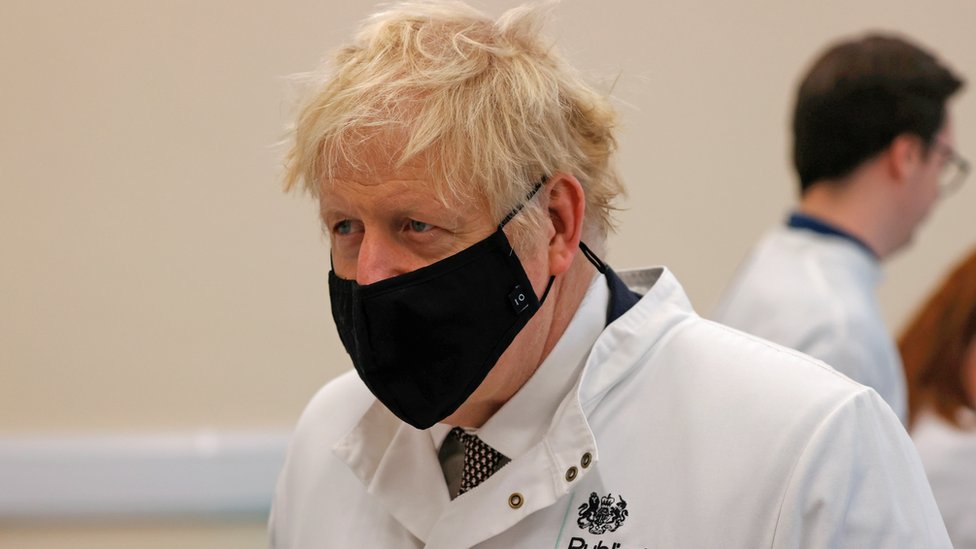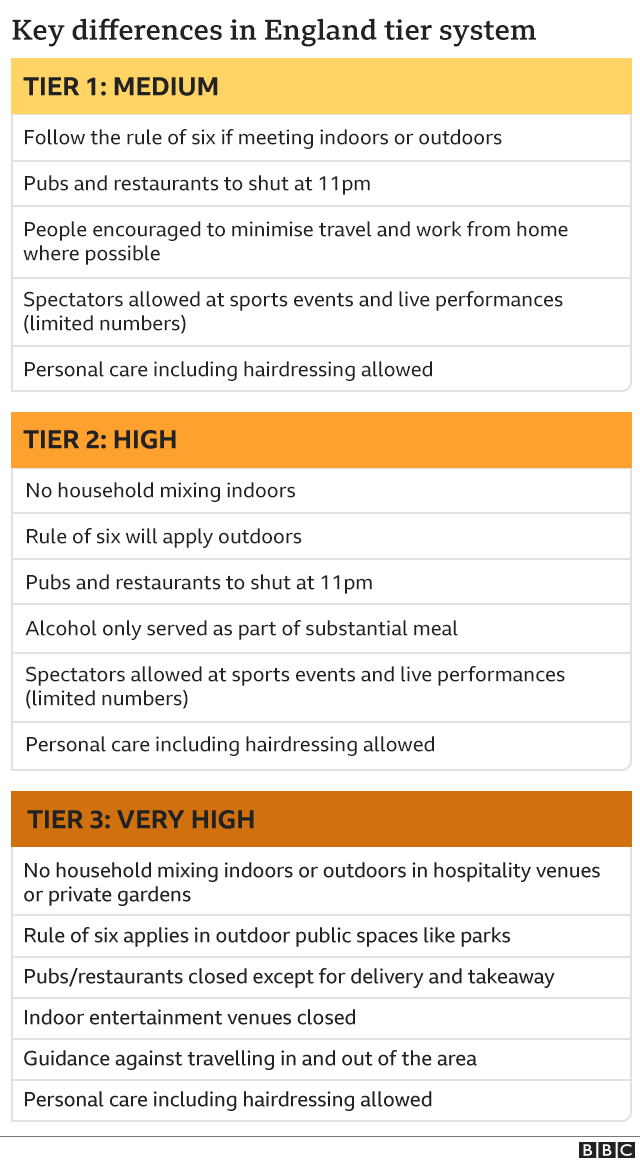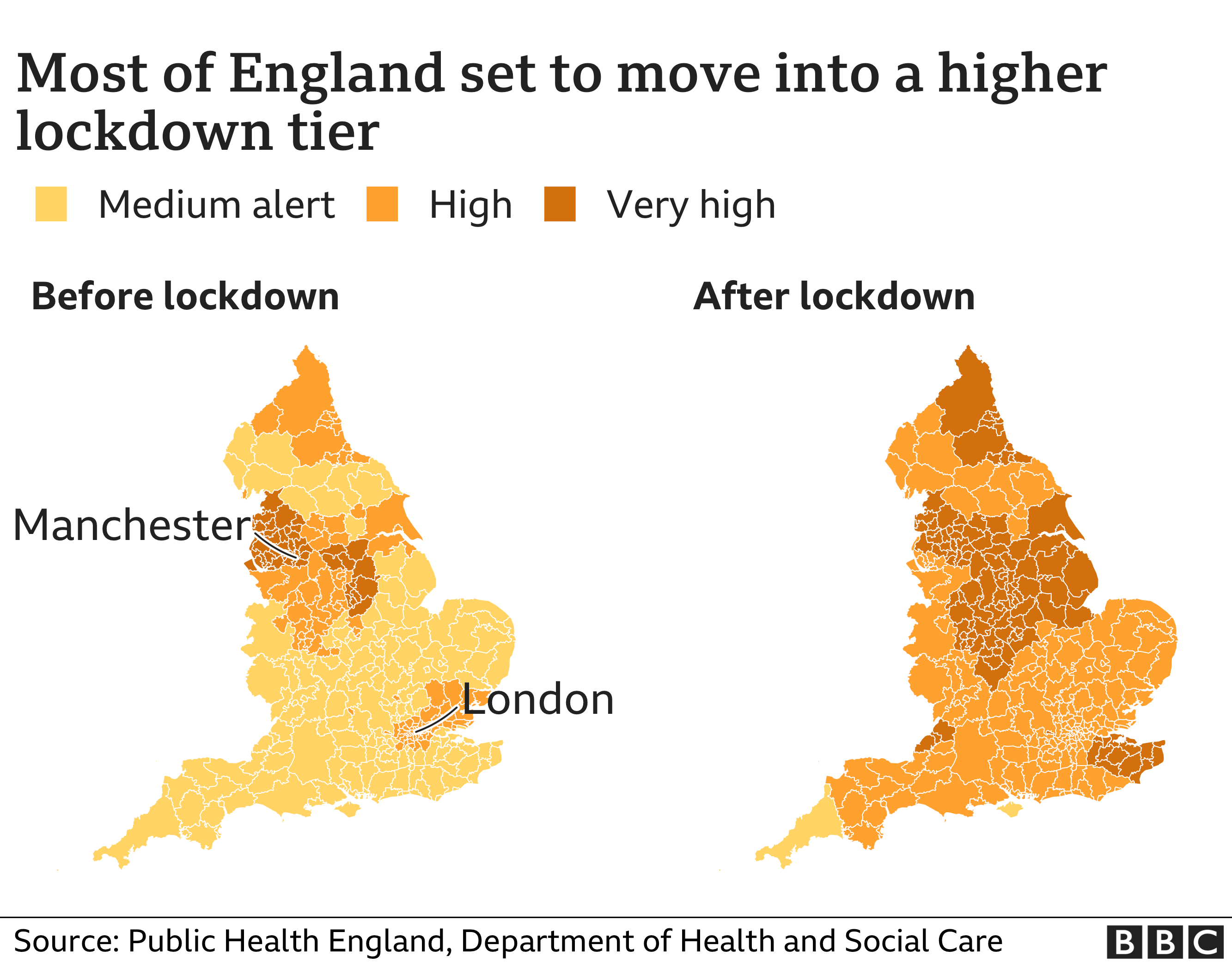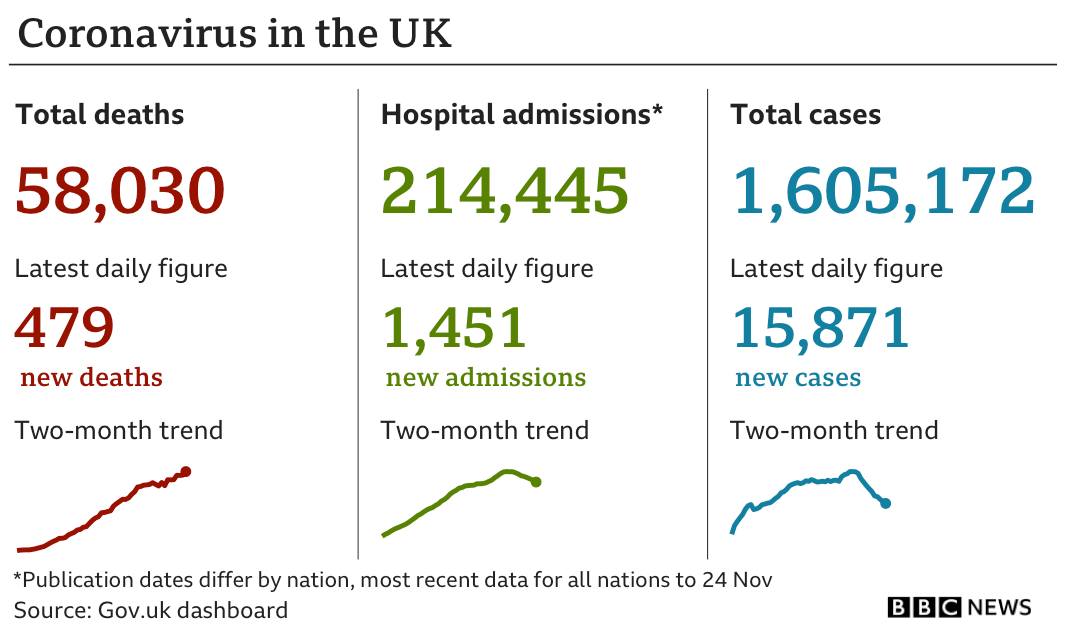
England's new Covid tier system has a "sunset" expiry date of 3 February, Boris Johnson has told his MPs in a bid to prevent a Commons rebellion.
The current lockdown ends on Wednesday, and many Tory MPs are unhappy with the toughened tiers that will replace it.
MPs will vote on the system on Tuesday, with Labour undecided on its stance.
In a letter to his MPs, the PM said rules could be eased in December, MPs could vote again in January, and the tier system could end in February.
And writing separately in the Mail on Sunday, Mr Johnson said he believed Easter would mark a "real chance to return to something like life as normal".
He warned, however, there would be "disastrous consequences" for the NHS if the government did not introduce the new tiered system when lockdown ends.
England's new system will see regions placed in one of three tiers: medium, high and very high.
In total, 99% of England will enter the highest two tiers, with tight restrictions on bars and restaurants and a ban on households mixing indoors. Only Cornwall, the Isle of Wight and Isles of Scilly will be in the lowest tier.
In a bid to quell MPs' concerns, Mr Johnson wrote to them outlining a timeline of when - and how - the tiered approach will end.
In his letter, Mr Johnson said:
- Regulations have a "sunset" clause - or expiry date - of 3 February
- Tiers will be reviewed every two weeks, and areas can move down the tiers from 16 December
- At the end of January, MPs will have another vote on the tiered approach and decide whether measures stay in place until the end of March
- The government will publish the circumstances that need to change for an area to move down a tier


In his letter to the public, the prime minister urged people to support the new system and "work together" with tiering, testing and vaccines.
He said: "We can't blow it now. We can't just throw it all away - not when freedom is in sight.
"We have worked too hard, lost too many, sacrificed too much, just to see our efforts incinerated in another volcanic eruption of the virus."
Third wave 'risk'
Foreign Secretary Dominic Raab told the BBC's Andrew Marr that having a tier approach "allows us to have these localised restrictions".
"Having them at this level allows us to ease off [on restrictions] when we're confident we can do so," he said.
When asked whether he believed the UK would face a third wave of the virus, he said: "There's a risk of that if we don't get the balance right."
Asked by Sophy Ridge on Sky News whether the government was looking at breaking counties into smaller areas for the tiers, given differences in rates of the virus within tier areas, Mr Raab said the measures will be reviewed every two weeks.
"We always look at all things, but the problem is you've got to get the geographic size sufficiently effective that you don't find the smaller enclaves of lower level virus shooting up because they are no subject to the restrictions in the high levels around them," he said.
Elsewhere in the UK, Northern Ireland has begun a two-week circuit-breaker lockdown, while in Scotland each area has been placed in one of five tiers.
In Wales, First Minister Mark Drakeford said pubs, restaurants and bars will be subject to stricter restrictions - which are not yet finalised - in the run up to Christmas. They will come into force from Friday, 4 December.


Conservative rebels were increasingly confident that they could demolish Boris Johnson's majority of 80 on Tuesday when the Commons votes on the proposed three tiers of restrictions in England.
That would make the PM reliant on Labour votes to get his measures through - and the opposition hasn't yet committed to backing him.
So, on Saturday night, there was a dramatic intervention to try to defuse the revolt.
In the letter to his MPs, Mr Johnson - in effect - pleads with them to give him the benefit of the doubt this week, in return for a new vote on the restrictions at the end of January.
If the government were to lose that vote, restrictions would end on 3 February.
He also seeks to reassure them that the review of restrictions on 16 December will be genuine, so it's possible some areas could move down a tier before Christmas
But one potential rebel, the former minister Tim Loughton told the BBC that the PM would have to do more to win him over.
He said: "We asked for a lot of information and that letter doesn't contain it. So unless we get it by Tuesday... then it doesn't change anything I'm afraid."
It's still possible Mr Johnson's new promises will sway some waverers, though a major rebellion may simply be postponed rather than avoided entirely.


Mr Johnson's pleas to MPs and the nation come after Cabinet Office Minister Michael Gove warned hospitals in England face becoming "overwhelmed" with cases if the new restrictions are not introduced.
Mr Gove said MPs needed to "take responsibility for difficult decisions".
He added that, across the UK, about 16,000 beds are filled with Covid-19 patients, compared to a peak in April of almost 20,000 and a low of 740 on 11 September.
However, Conservative MP Tobias Ellwood said all seven Nightingale hospitals, built during the first wave of the pandemic, lie "largely empty", adding that military medical staff could help run them.
And Tory MP Steve Baker reiterated the request to see the data the government was basing its new system on.
He tweeted that MPs were "glad to share in the burden of decision", but added: "That's why we need the information necessary to show the government's restrictions will do more good than harm, in full and in time. It is a modest request."
On Saturday, a further 479 deaths within 28 days of a positive test were reported in the UK, bringing the total to 58,030. There were also a further 15,871 positive cases registered in the past 24 hours.

- LOCKDOWN LOOK-UP: The rules in your area
- SOCIAL DISTANCING: What are the rules now?
- SUPPORT BUBBLES: What are they and who can be in yours?
- FACE MASKS: When do I need to wear one?
- TESTING: How do I get a virus test?

Meanwhile, the government has secured a further two million doses of a coronavirus vaccine from US firm Moderna, which has shown to be 95% effective in trials.
This brings the UK's Moderna order to seven million - enough for around 3.5 million people.
Separately, the UK has placed orders for 100 million doses of the Oxford vaccine, and 40 million doses of the jab from Pfizer and BioNTech, which has also been shown to be 95% effective.
Health Secretary Matt Hancock said: "We stand ready to deploy a vaccine should they receive approval from our medicines regulator, starting with those who will benefit most."




https://news.google.com/__i/rss/rd/articles/CBMiJmh0dHBzOi8vd3d3LmJiYy5jby51ay9uZXdzL3VrLTU1MTE4NDY30gEqaHR0cHM6Ly93d3cuYmJjLmNvLnVrL25ld3MvYW1wL3VrLTU1MTE4NDY3?oc=5
2020-11-29 10:22:00Z
52781212068131
Tidak ada komentar:
Posting Komentar